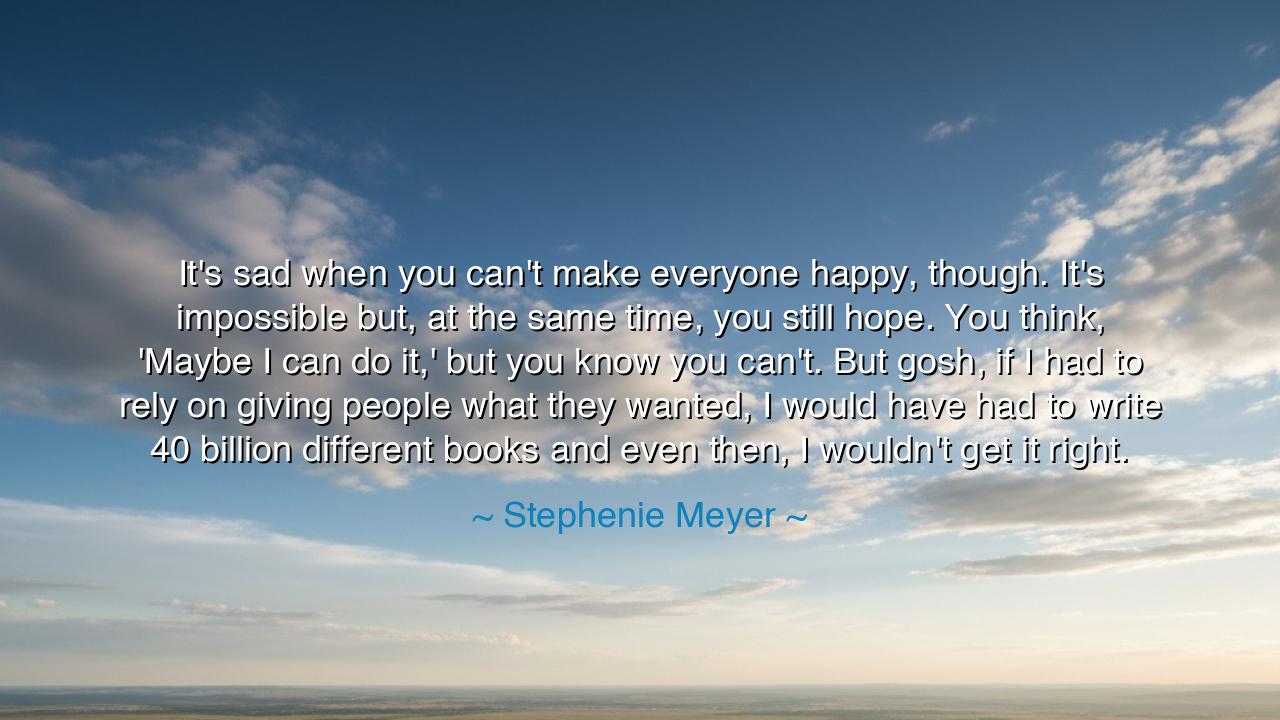
It's sad when you can't make everyone happy, though. It's
It's sad when you can't make everyone happy, though. It's impossible but, at the same time, you still hope. You think, 'Maybe I can do it,' but you know you can't. But gosh, if I had to rely on giving people what they wanted, I would have had to write 40 billion different books and even then, I wouldn't get it right.






“It’s sad when you can’t make everyone happy, though. It’s impossible but, at the same time, you still hope. You think, ‘Maybe I can do it,’ but you know you can’t. But gosh, if I had to rely on giving people what they wanted, I would have had to write 40 billion different books and even then, I wouldn’t get it right.” — so spoke Stephenie Meyer, the writer whose tales of love and shadow captured the hearts of millions. Her words, though gentle in tone, hold a truth that has echoed since the dawn of creation: that the desire to please everyone is a burden that crushes the spirit, and that true art — indeed, true living — demands the courage to be misunderstood.
The origin of this reflection comes from Meyer’s own experience as a creator who rose suddenly into the public eye. Her Twilight series, though beloved by countless readers, also drew fierce criticism. With her name on the tongues of both admirers and detractors, she discovered what every artist, leader, and dreamer learns: that to create anything meaningful is to invite both praise and judgment, and that no work of the soul can satisfy all hearts. Thus she speaks with weary tenderness of that eternal conflict — the yearning to bring joy to all, and the acceptance that one must not build one’s worth upon the impossible task of universal approval.
In her words, there is both sorrow and wisdom. “It’s sad when you can’t make everyone happy,” she admits, and in that sadness lies the compassion of one who truly cares. Yet she also names the truth that perfection in the eyes of others is not only unreachable, but destructive. To try to please all is to lose oneself; to chase every opinion is to wander forever. The one who walks this path becomes a stranger to their own vision, shaping their work not by truth, but by the shifting winds of others’ expectations. Meyer’s honesty reminds us that the world’s desires are infinite and conflicting — that even “40 billion different books” would not suffice, for the hunger of approval is endless.
The ancients knew this too. The philosopher Socrates, condemned for “corrupting the youth” of Athens, could have lived had he flattered his judges. Instead, he drank the hemlock, choosing truth over comfort, and said to his accusers, “To fear death, gentlemen, is to think one knows what one does not know.” Like Meyer, he understood that to live by the approval of others is to live falsely — and that the only peace lies in fidelity to one’s own calling. Those who seek to please all will find no rest, for they surrender their soul to the multitude. But those who stand firm in their truth — even when mocked or scorned — become immortal in their integrity.
And yet, Meyer’s confession carries a tenderness that separates it from defiance. She does not sneer at her critics, nor close her heart to them. Instead, she acknowledges the paradox of the human heart: even knowing it is impossible to please everyone, we still hope we might. This hope is not weakness, but love — the yearning to connect, to be understood, to bring light to others. The wise do not extinguish this hope; they simply learn to temper it with acceptance. They learn to say, “I will do my best to bring forth what is true — and I will let that be enough.”
Her words also speak to the broader struggle of every soul who dares to create or to lead. Whether one writes a book, raises a family, teaches, builds, or dreams — there will always be voices that demand more, that question, that disapprove. The measure of success, then, cannot be universal satisfaction, but authentic expression. For to live rightly is not to make all men happy, but to act with honesty and heart. The artist must write the book that burns within; the leader must follow conscience, not applause; the parent must love without needing to be adored. This is the path of all who create something real.
Therefore, my listener, let this teaching be your compass: Do not seek to please all. Seek to be true. The one who lives for approval builds upon sand; the one who lives from conviction builds upon rock. Accept that disagreement is the shadow cast by greatness. Know that hope, though it aches, is holy — but that it must be guided by purpose, not by fear. When the world demands 40 billion versions of yourself, offer them only one — your truest self — and let that be your legacy.
For in the end, Stephenie Meyer’s words remind us that art, like life, is not about perfection, but about honesty. You cannot make everyone happy — but you can make something meaningful. You cannot satisfy every ear — but you can speak with sincerity. And that, perhaps, is the secret she discovered in her own “hard hope”: that it is better to touch a few hearts deeply than to please the world shallowly. So live, speak, and create not for the crowd, but for the truth that burns within you — for that truth, once shared, will outlast every voice that sought to drown it.






AAdministratorAdministrator
Welcome, honored guests. Please leave a comment, we will respond soon